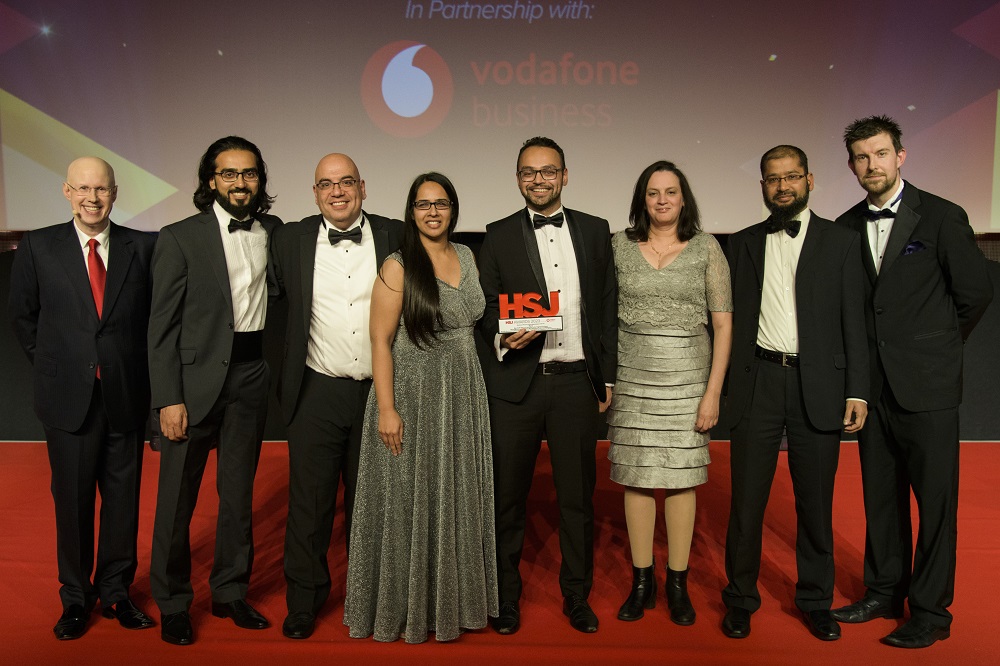Stroke

Introduction

We are one of the leading stroke centres in the country
With some of the best survival rates in London
We provide fast access to treatment before transferring patients to our hyper-acute stroke unit at The Royal London or an acute care unit closer to home.
We provide the most advanced and successful treatments. Working closely with University College London Partners and Barts Health School of Medicine and Dentistry, our team of clinicians and scientists are at the forefront of research – investigating new therapies and treatments for the treatment of stroke.
We offer the best technology for patients

We offer innovative technology
Providing patients with faster, safer care
Stroke patients at The Royal London Hospital now receive faster, safer and more accurate care thanks to cutting-edge imaging technology — the first of its kind in the UK. This advanced scanner helps doctors treat strokes more quickly, using clearer images and lower radiation.
This allows us to treat more patients with life-saving treatment, helping them recover more quickly and regain independence.
European first to use balloon guide catheter

We remove clots faster using a balloon guide catheter
In a European first
The new device, EMBOGUARD, helps doctors remove dangerous blood clots from the brain more quickly and effectively during a stroke, allowing more patients to have a much better chance of avoiding serious brain damage and living a full, independent life.
By combining world-leading technology with expert care, we’re giving thousands of people across south and east England the best possible chance of recovery.
Community stroke service
After a stroke, the right support can make a big difference.
That’s where the Tower Hamlets community stroke team comes in. We're a group of specialists — including physiotherapists, speech and language therapists, occupational therapists, psychologists and support workers — who work together to help you recover and feel more confident.
We’ll support you with a personalised rehab plan based on your goals, whether that means getting stronger, speaking more clearly, or feeling more independent. We can visit you at home, see you in clinic at The Royal London Hospital, or meet somewhere else in the community — whatever works best for you.
We’ll also help your family, friends or carers understand what to expect and how they can support you. You’ll always be involved in your recovery, and we’ll regularly check in to make sure your plan is working for you. If you need more support, we can connect you with other services too. Our aim is to be by your side, helping you rebuild your life after stroke.
Service and eligibility criteria
Referrals are accepted for people who:
- Have received a diagnosis of a new stroke (within the last 12 months)
- Are aged 18 or over
- Are currently living in Tower Hamlets
If an individual’s stroke diagnosis is over 12 months, please refer to the Tower Hamlets Community Neuro Team (THCNT) via the Single point of access form for adult community services[docx] 68KB.
It is preferable, but not essential to have a GP in Tower Hamlets.
Referral form information should include appropriate therapy goals, where possible.
Refer to us
Please complete the Tower Hamlets Community Stroke Team referral form[doc] 260KB and send it to us via email.
You may be referred to our early supported discharge team or our community stroke rehabilitation team.
Contact us
Visit us
Outpatient therapies department
Level 2, North Tower
The Royal London Hospital
Whitechapel Road
London E1 1FR
Phone us
020 3594 1156
For patients
We want our patients to feel supported throughout their time with us. Our dedicated staff will care for patients during their treatment and also in the months that follow. We also provide advice to carers and families.
The services we offer at the Trust are:
- Clinical assessment
- Drug treatments
- Hospital test
- Lifestyle advice
- Hyper-Acute Stroke Unit
- Acute Stroke Unit
- Mini strokes (TIA) clinic
- Inpatient and community-based rehabilitation
- Post stroke spasticity clinic
- Contact us
Clinical assessment
Once a stroke has been diagnosed, it is important to determine how this will affect the patient. We have an expert therapy team, including a physiotherapist, an occupational therapist and speech and language therapist, who can provide specialist advice and treatment. Their services are used on the acute units for rehabilitation and by the community team. The team are skilled at assessing physical, emotional, sensory, cognitive, perceptual, speech and swallowing difficulties and can also suggest the most appropriate rehabilitation for each individual patient.
Drug treatments
Most stroke patients need a combination of drugs to reduce the clotting tendency of the blood, to lower blood-pressure and to reduce cholesterol.
The latest treatment for some forms of stroke (caused by a clot) is thrombolysis. A drug called Alteplase is injected into the bloodstream to dissolve the clot and restore the blood supply to the affected part of the brain. If there are still viable nerve cells in this area, the cells can potentially recover if the treatment is given in time. Speed is vital, as for every minute lost, two million brain cells will die (within the first three hours of the stroke’s onset). Patients who receive this treatment stand a reasonable chance of complete recovery, whereas otherwise they would have suffered a disability.
The disadvantages are that thrombolysis can cause bleeding into the brain, especially if the stroke is a large one. It is only suitable for a few patients, and doesn’t work for everyone, so a highly specialist assessment is needed to ensure that this treatment is appropriate and is as safe and effective as possible.
This treatment is given to patients from The Royal London Hospital.
Hospital tests
We will conduct tests to find out where the stroke is, how serious it is, and what caused it (a bleed into the brain or a blood clot). A computed tomography (CT) scan of the brain will be carried out and the patient may also have blood tests, a blood pressure test, and an ECG (electrocardiogram) to look for unusual heart rhythms as this can be a risk factor for stroke.
These tests are conducted as soon as possible after a stroke, so that we can start on appropriate treatment and maximise the chances of a full recovery.
We offer specialist investigations to people who have been seen as an outpatient or who come to us through the Emergency Department at The Royal London Hospital, Whipps Cross University Hospital or Newham University Hospital.
Lifestyle advice
There is a lot that you can do to reduce the risk of having another stroke. Our specialists can give advice on lifestyle changes such as giving up smoking, having a healthier diet and taking more exercise. They can also talk to you about appropriate support services that can help you enjoy a healthier lifestyle.
Hyper-Acute Stroke Unit
The Royal London Hospital is a specialist centre for stroke and home to one of eight designated hyper-acute stroke units (HASUs) in London. HASUs have been established by Healthcare for London to improve the quality of stroke care in the capital. We have a fully operational HASU with 12 monitored beds and eight acute stroke (SU) unit beds based on Ward 3E at the Royal London Hospital. The HASU/SU model consistently delivers high quality stroke care and excellent outcomes for stroke patients.
The HASU admits all acute stroke patients in north east London within 14 minutes of dialling 999, which is the national average response time. The Centre brings together experts from a range of disciplines and specialised equipment to provide world-class treatment 24 hours a day, reducing long-term disability.
This includes:
- rapid assessment – patients with suspected stroke will be assessed by a specialist and have access to an immediate brain scan, when clinically indicated
- access to early treatment using clot-busting drugs (thrombolysis)
- 24/7 monitoring and physiological intervention in specialised stroke high-dependency beds
- a consultant led service with expertise drawn from across the north east London sector, including stroke specialists from The Royal London Hospital, Homerton Hospital, Newham University Hospital and Whipps Cross University Hospital rotating through the HASU.
- a multidisciplinary team approach with patients being seen by experts including stroke consultants, specialist nurses and a team of stroke therapists, including physiotherapists, occupational therapists, speech and language therapists.
- a key worker who is assigned to the patients on the unit and responsible for guiding rehabilitation, planning discharge, liaising with community services and patients families’. A family meeting may be arranged to discuss discharge from hospital plans.
Research shows that people treated on a stroke unit by an experienced multidisciplinary team do better in terms of medical and functional recovery. Our unit provides a seamless integrated model of care with daily wards rounds and weekly review meetings. The stroke team is determined to deliver a responsive service and ensure that the Trust’s vision of world class stroke care is accomplished.
Acute Stroke Unit
We have two acute stroke units which care for patients both in the acute phase of their stroke and those who require continued specific hospital based rehabilitation.
Our units have designated gyms with state of the art rehabilitation equipment and purpose built occupational therapy kitchens to ensure focused assessments. Our Newham unit is surrounded by landscaped gardens with wheelchair access to enhance the therapeutic experience.
We have acute stroke units at Newham University Hospital and Whipps Cross University Hospital.
Mini strokes (TIA) clinic
A transient ischaemic attack (TIA) is a temporary lack of blood supply to part of the brain which causes a set of short-term symptoms. It is sometimes called a ‘mini stroke’ but unlike a stroke, the symptoms do not last and patients recover within a few hours. However, there is a 10% risk of having a large stroke in the week following a TIA.
At TIA our outpatient clinics patients who are at risk are identified so that they can receive fast-track treatment. We aim to see a high risk patient within 24 hours, following a referral from a GP or a Barts Health Emergency Department.
This service benefits around 300 local people a year who suffer from TIAs.
We run mini strokes (TIA) services from Mile End Hospital, Newham University Hospital, Whipps Cross University Hospital.
Inpatient and community-based rehabilitation
Our stroke team will devise a rehabilitation programme for every patient to support their recovery. Most of our patients will have already been treated in a hyper-acute stroke unit.
A patient’s rehabilitation programme could include:
- physiotherapy at home, work or school, to help with muscle weakness
- speech and language therapy to help with swallowing and communication problems
- sessions with a clinical psychologist to help with emotional problems
- input from an occupational therapist to give practical advice on performing everyday tasks such as washing, dressing, shopping and cooking.
Our therapists help patients to return to work or school, in a planned and supported way. The team also offer specialist nursing input, dietetic advice, liaison with social services and access to a wheelchair service. In addition, we can arrange for our patients to be assessed by experts in orthoptics (to diagnose and manage binocular vision), orthotics (experts in medical devices), and mental health specialists.
The inpatient acute rehabilitation service enables patients to continue their rehabilitation closer to home.
We run rehabilitation services from Mile End Hospital, Newham University Hospital, The Royal London Hospital and Whipps Cross University Hospital.
Stroke follow-up clinics
We offer follow-up clinics for all stroke patients and their families/carers, six weeks after their discharge from hospital. This allows us to review their progress, help with on-going stroke complications, optimise the prevention of future stroke and conclude outstanding tests. Patients will continue to be followed up, if necessary.
Newham University Hospital
Stroke outpatient services
Tel: 0207 363 9012
Tower Hamlets Community Stroke Team
Outpatient Therapies
Royal London Hospital
Telephone-0203 594 1156 / 1162
Single point of enquiry
0203 594 1156/ 1162
Stroke Clinic Royal London Hospital, South Tower, 2nd Floor: 0203 594 2127 / 2128
Tower Hamlets CST referral form 260KB
Whipps Cross Hospital
Peace Ward, Junction 10, Lower Ground Floor
Tel: 020 8539 5522 ext 6649
Community Stroke team- Waltham Forest
Gillian Revell Unit, Peace Ward, Whipps Cross Hospital
Telephone: 020 8535 6429
Single point of enquiry Tel: 07984 030 707
Waltham Forest CST referral form 143KB
Waltham Forest CST information booklet 1MB
Post stroke spasticity clinic
Stroke can often result in problems with increased muscle tone which can restrict mobility and prevent effective participation in therapy.
At Newham University Hospital we have dedicated clinics that are run by consultants and senior physiotherapists. We assess suitable patients and develop specific tailored treatment plans to improve independence.
Contact us
Community Stroke Team
Tel: 020 8121 4270
Fax: 020 8223 8716
Email: communications@elc.nhs.uk
For stroke services at Newham University Hospital
Stroke outpatient services
Tel: 0207 363 9012
For stroke services at The Royal London Hospital
Hyper-Acute Stroke Unit
Location: Ward 3E, Third Floor, South Tower
Tel: 020 359 40320 or 020 359 42195
Fax: 020 359 42202
For stroke services at Whipps Cross University Hospital
Acute Stroke Unit
Location: Wavell Ward
Tel: 020 8539 5522 ext 6231 or 5587
Stroke rehabilitation
Location: Peace Ward, Junction 11, Lower Ground Floor in the Green Zone.
Tel: 020 8539 5522 ext 6649
Please contact therapy staff from 8.30am-4.30pm, Mondays to Friday.
For clinicians
Patients with acute stroke and/or residual neurological deficit should be encouraged to attend the emergency department immediately.
Patients who have experienced a transient ischaemic attack (TIA)
It is important to immediately admit patients to a specialist stroke service as they have a greater than 20% risk of a completed stroke following a TIA.
In this category are patients who have had more than one TIA (transient ischaemic attack) in the past seven days.
It also includes patients with three or more of the following:
- blood pressure greater than 140/90 mmHg
- unilateral weakness or speech disturbance
- symptoms lasting 60 minutes or more
- Diabetes
Low risk patients should be referred using the TIA referral form available from the Department of Healthcare of the Elderly on: 020 8223 8843.
For further information on managing TIA and minor stroke, visit the National Guidelines on the Royal College of Physicians’ website.
For referrals
Mile End Hospital, rehabilitation
Referral letters should be sent for the attention of:
Dr Patrick Gompertz, Stroke Consultant
Room 119, 1st Floor, John Harrison House
The Royal London Hospital Campus
Philpot Street
London, E1 1BB
Tel: 020 8223 8843
Fax: 020 7377 7844
Email: bhnt.tiaclinic@nhs.net
Urgent cases will be seen within seven days.
Patients need to:
- be aged 16+
- be living in the borough of Tower Hamlets, either in their own home or another residential facility
- have had a new stroke and seen as part of the stroke pathway
- be requiring assessment and possibly rehabilitation by practitioners specialising in physical and neurological disability
- be assessed by the team as having the potential to derive a health benefit or other gain from therapy (eg maintain function, avoid unnecessary complications, or prevent a deterioration in function and independence)
- be potentially able to actively participate in assessment and treatment given appropriate opportunities and support
The Royal London Hospital
To refer a patient to The Royal London Hospital, please either use the eRS system (for first outpatient appointments) or send a letter to:
Outpatients Appointments Office
Barts Health NHS Trust
1st Floor, 9 Prescot Street
London, E1 8PR
Tel: 020 7767 3200 Call from 8.30am-5pm, Monday to Friday
Fax: 020 7791 9670
Newham University Hospital and Whipps University Hospital
To refer patients to Newham or Whipps University Hospital please use the Choose and Book system (for first outpatient appointments).
Clinics available at Newham University Hospital are:
- Mini stroke (TIA) clinic
- Stroke follow-up clinic
- Post stroke spasticity clinic
Clinics available at Whipps Cross University Hospital:
- Mini stroke (TIA) clinic
- Stroke follow-up clinic
Stroke consultants
-
Dr Oliver Spooner
Consultant












